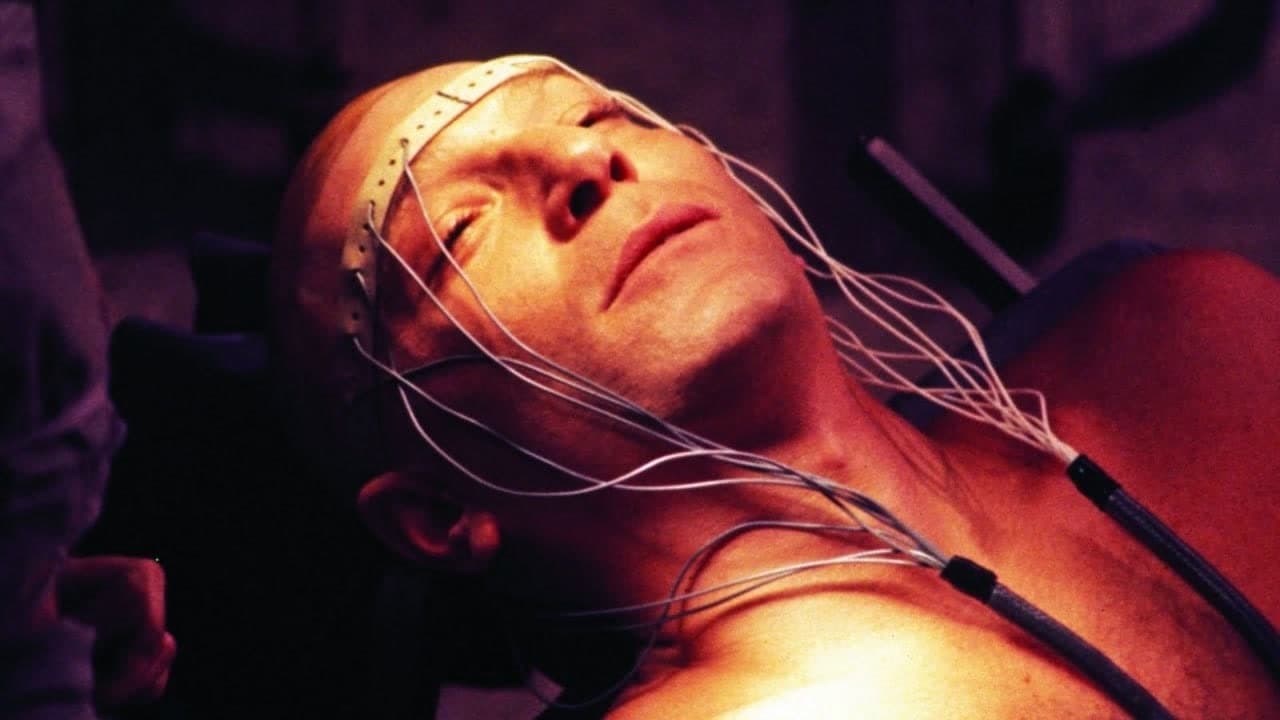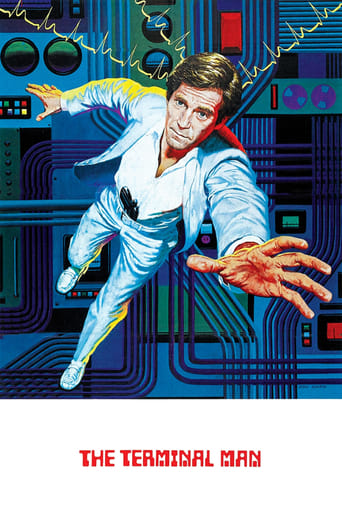Linbeymusol
Wonderful character development!
Boobirt
Stylish but barely mediocre overall
Plustown
A lot of perfectly good film show their cards early, establish a unique premise and let the audience explore a topic at a leisurely pace, without much in terms of surprise. this film is not one of those films.
Zandra
The movie turns out to be a little better than the average. Starting from a romantic formula often seen in the cinema, it ends in the most predictable (and somewhat bland) way.
moonspinner55
Brilliant computer scientist (George Segal) has been involved in an auto accident which left "a pressing" on his brain; uncontrollably angry and violent, he has nearly killed two people. Diagnosed with paraepilepsy, he's now become the willing subject for a new surgical procedure to the brain...but the 'rewiring' which takes place may prove to be no cure at all. Intentionally clinical and cold, this adaptation of Michael Crichton's novel has been directed by Mike Hodges with barely a trace of personality, stray levity, energy or irony. Many of the doctors and nurses on-screen have been erased of their individuality; the one doctor who disapproves of the operation (Joan Hackett) has to get her compassion for the subject across by using her eyes (and by calling out his name, "Harry!", repeatedly). Hodges, who also penned the script after Crichton himself was removed from the project, seems to frown on frank verbal exchanges. Everything is muted for an effect. The supporting cast is filled with excellent character actors who ultimately don't get around to doing much, while the star of the picture seems curiously misplaced. Segal can be a fine dramatic actor, but when he's on the loose here (in an ill-fitting wig) he just looks silly. The style of the film (or rather, the look of it, as 'style' gives the production unearned prestige) has attracted latter-day admirers, this despite the pretentious artistic flourishes. Stanley Kubrick was reportedly impressed with the picture, although this could be legend (there's an attack on a locked bathroom door which is amusingly similar to "The Shining"). However, the narrative isn't gripping, the jaundiced bits of dried-out cynicism are kept bubbling under the surface, and the finale dribbles away instead of packing a punch. *1/2 from ****
Coventry
I'm a big admirer of the writer Michael Crichton. Perhaps I'm a bigger admirer of his work than I am a fan of it, if that makes sense. I admire and tremendously respect Crichton because he was one of the sole Sci-Fi writers in history able to create an almost entirely new sub genre and yet remain creative and versatile within that sub genre. Even though his finest stories like "The Andromeda Strain", "Westworld", "The Terminal Man" and even "Jurassic Park" are seemingly very differing tales, they basically do share the same basic concept, namely artificial technology and/or science that develops and turns into a giant menace to the same human that created it. I'm also a big admirer of Michael Crichton because he was a very intelligent person – probably one of the only Sci- Fi/thriller novelists with a Harvard Medical School degree – and thus knew very well what he was writing about. The films he directed, as well as the ones adapted from his novels, are often extremely complex, talkative and stuffed with professional jargon. That's not because he was pretentious, but because he was an expert. Crichton referred to "The Terminal Man" as the worst adaptation of his work, but maybe that has to do with personal resentment because he was initially set to adapt his own novel and direct, but got fired by the directors. "The Terminal Man" is everything but a bad film, although it's fairly easy to see why many people dislike it. The brief plot description promises an exciting concept of a man suffering from psychosis who agrees to participate in a scientific/medical experiment in which a tiny computer is implanted in his brain that will keep his violent impulses under control. Although seemingly successful at first, the man's brain somehow becomes addicted to the little shocks that the electrodes are sending out, resulting in the triggering of even more violent impulses. If you read it like this, "The Terminal Man" sounds like a tense, exciting and action-packed thriller, but instead it's actually a slow-brooding, atmospheric and integer drama. It all is a bit misleading perhaps… The premise speaks of "A man suffering from a mental condition that often causes him to become homicidal", but we are only introduced to Harry Benson when he obediently awaits the operation and remains very calm and docile at all times. There are only a few photographs to indicate his violent nature. Then the operation itself is almost shown integrally, which raises the impression to last forever. Then, finally, the plot describes how Benson – and I quote – "escapes from the hospital and goes on a spree of violence and murder". Well, first of all, there's a long period of time between the operation and the escape in which barely anything happens. The so-called spree of violence and murder is somewhat exaggerated as well, since Benson only commits one murder (although admittedly a very savage one). However, to compensate for the lack of action, we do receive – next to the intelligent and tense script – a continuous series of extraordinary beautiful camera angles, compositions and set-pieces. Director Mike Hodges ("Get Carter", "Pulp") literally turns the film into a work of art, with stunning cinematography and exquisite use of classical music. I honestly wished for "The Terminal Man" to benefice from a faster pacing, a bit more background to Harry Benson's character, a bit less medical mambo-jumbo and a few more brutish murders.
raypdaley182
Segal plays a man who has had an accident and suffered some sort of cranial injury (I'm sorry Micheal Crichton, It really isn't explained well enough in my opinion). He is then subjected to a pioneering new medical treatment previously only ever tried on monkeys.This is where the film falls down. Has Micheal never heard of all the testing, trials and licensing procedures that drugs and medical procedures have to go through. So basically the entire idea for the plot is scuppered right away before the movie even really gets a chance to start.The film pursues the idea anyway, and Segal has a micro implant into his brain to control impulses that cause him want to kill.Yep, of course it fails and the implant starts giving him the impulses. Segal escapes the hospital after his operation (how is he even able to do anything after major surgery on his brain?) he starts having attacks and kills his girlfriend and runs off on a frenetic killing frenzy. his implant is being monitored and the scientists are able to predict when he will strike but not where. (surely the nuclear implant would have been traceable?) finally after killing a priest Segal thinks about killing himself and finds himself in a cemetery (didn't understand how he got here either) and falls into an open grave but is carrying a pistol. he has a seemingly fatal fit but is near catatonic - not dead. the police kill him despite the fact he has dropped his gun (the marksman would have seen this through his telescopic sight and LEGALLY could not fire his weapon so he committed murder) and the end is very bad and totally impossible to understand.are they planning to try this procedure again with another prisoner? weird but strangely watchable like THX-1138.
m_l_sweeney
Slow, sure...but the real crime here is a zombie-like George Segal (in a bad wig most of the film) but NO amiable banjo-playing! Darn!PLENTY of these semi-plodding scenes could've been livened up with a wry wink and some Shakey's-pizzeria-style banjo noodling from Johnny Carson's 5,756th favorite guest...Oh well -- at least stabbing Jill Clayburgh to death on a waterbed sets a good tone for the rest of the '70s (only Karen Black -- or maybe Susan Anspach -- as the victim would've been more aptly emblematic)...C'mon -- would it have killed the auteur to end the sterile, over-wide-screened mise-en-scene with Segal playing a banjo in that open grave...THEN a blissfully anticipated hail of bullets silencing "Oh, Susannah" (or whatever). Happy ending all around (except for Jill Clayburgh, of course)...(Bonus points for spotting later '80s TV semi-stars in small parts...look, there's the Nazi SWAT cop from "Hill Street Blues"! And isn't that the old doctor who showed his ass on "St. Elsewhere," then offed himself years later? Yep and yup...)

